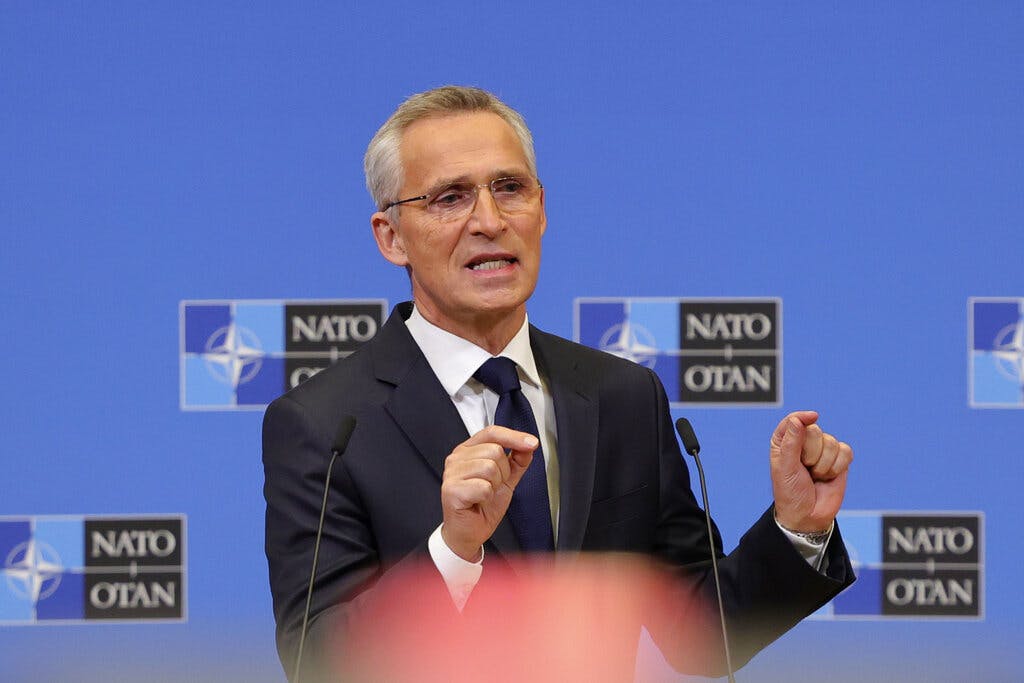Poland and NATO, Downplaying Missile Strike, Deny It Was a Russian Attack
The assessment dials back the likelihood of the strike triggering a major escalation in the conflict.

PRZEWODOW, Poland — NATO member Poland and the head of the military alliance both said Wednesday a missile strike in Polish farmland that killed two people did not appear to be an intentional attack, and that air defenses in neighboring Ukraine likely launched the Soviet-era projectile against a Russian bombardment that savaged the Ukrainian power grid.
“Ukraine’s defense was launching their missiles in various directions and it is highly probable that one of these missiles unfortunately fell on Polish territory,” said the Polish president, Andrzej Duda. “There is nothing, absolutely nothing, to suggest that it was an intentional attack on Poland.”
NATO’s secretary-general, Jens Stoltenberg, at a meeting of the 30-nation military alliance in Brussels, echoed the preliminary Polish findings, saying: “We have no indication that this was the result of a deliberate attack.”
The initial assessments of Tuesday’s deadly missile landing appeared to dial back the likelihood of the strike triggering another major escalation in the nearly 9-month-old Russian invasion of Ukraine. If Russia had deliberately targeted Poland, that could have risked drawing NATO into the conflict.
Still, Ms. Stoltenberg and others laid overall but not specific blame on President Putin’s war.
“This is not Ukraine’s fault. Russia bears ultimate responsibility,” Mr. Stoltenberg said.
Before the Polish and NATO assessments, President Biden had said it was “unlikely” that Russia fired the missile but added: “I’m going to make sure we find out exactly what happened.”
Three American officials said preliminary assessments suggested it was fired by Ukrainian forces at an incoming Russian one. The officials spoke on condition of anonymity because they weren’t authorized to discuss the matter publicly.
That assessment and Mr. Biden’s comments at the Group of 20 summit in Indonesia contradicted information earlier Tuesday from a senior American intelligence official who told the Associated Press that Russian missiles crossed into Poland.
Ukraine, once part of the Soviet Union, fields Soviet- and Russian-made weaponry, including air-defense missiles, and has also seized many more Russian weapons while beating back the Kremlin’s invasion forces.
Ukrainian air defenses worked furiously against the Russian assault Tuesday on power generation and transmission facilities, including in Ukraine’s western region that borders Poland. Ukraine’s military said 77 of the more than 90 missiles fired were brought down, along with 11 drones.
Russia said it didn’t launch the missile that landed in Poland. A Defense Ministry spokesman said no Russian strike Tuesday was closer than 22 miles from the Ukraine-Poland border. The Kremlin denounced Poland’s and other countries’ initial response and, in rare praise for an American leader, hailed Mr. Biden’s “restrained, much more professional reaction.”
“We have witnessed another hysterical, frenzied, Russo-phobic reaction that was not based on any real data,” Kremlin spokesman Dmitry Peskov said.
Still, Ukraine was under countrywide Russian bombardment Tuesday by barrages of cruise missiles and exploding drones, which clouded the initial picture of what exactly happened in Poland and why.
The Polish president said the projectile was “most probably” a Russian-made S-300 missile dating from the Soviet era.
“It was a huge blast, the sound was terrifying.” said the primary school director, Ewa Byra, in the eastern village of Przewodow, where the missile struck. She said she knew both men who were killed — one was the husband of a school employee, the other the father of a former pupil.
Another resident, 24-year-old Kinga Kancir, said the men worked at a grain-drying facility, one as a guard, the other driving tractors.
“It is very hard to accept,” she said. “Nothing was going on and, all of a sudden, there is a world sensation.”
Ukraine said it wants immediate access to the site. The head of Ukraine’s National Security and Defense Council, Oleksiy Danilov, advocated on Twitter for a “joint examination of the incident.”
In Europe, NATO members Germany and the U.K. laced calls for a thorough investigation with criticism of Moscow.
“This wouldn’t have happened without the Russian war against Ukraine, without the missiles that are now being fired at Ukrainian infrastructure intensively and on a large scale,” said Chancellor Scholz.
Prime Minister Sunak said: “This is the cruel and unrelenting reality of Putin’s war.”
President Zelensky called it “a very significant escalation.” On the other end of the spectrum, China called for calm and restraint.
Damage in Ukraine from the aerial assault was extensive and swaths of the country were without power. Mr. Zelensky said about 10 million people lost electricity but tweeted overnight that 8 million were subsequently reconnected, with repair crews laboring through the night. Previous Russian strikes had already destroyed an estimated 40 percent of the country’s energy infrastructure.
Ukraine said the bombardment was the largest on its power grid so far. Pope Francis said it caused him “great pain and concern.”
A Washington-based think tank, the Institute for the Study of War, said Ukraine’s downing of so many Russian missiles Tuesday “illustrates the improvement in Ukrainian air defenses in the last month,” which are being bolstered with Western-supplied systems.
